‘Doctors Thought I Had Mastitis From Breastfeeding. Now I’m In Treatment For Inflammatory Breast Cancer.’
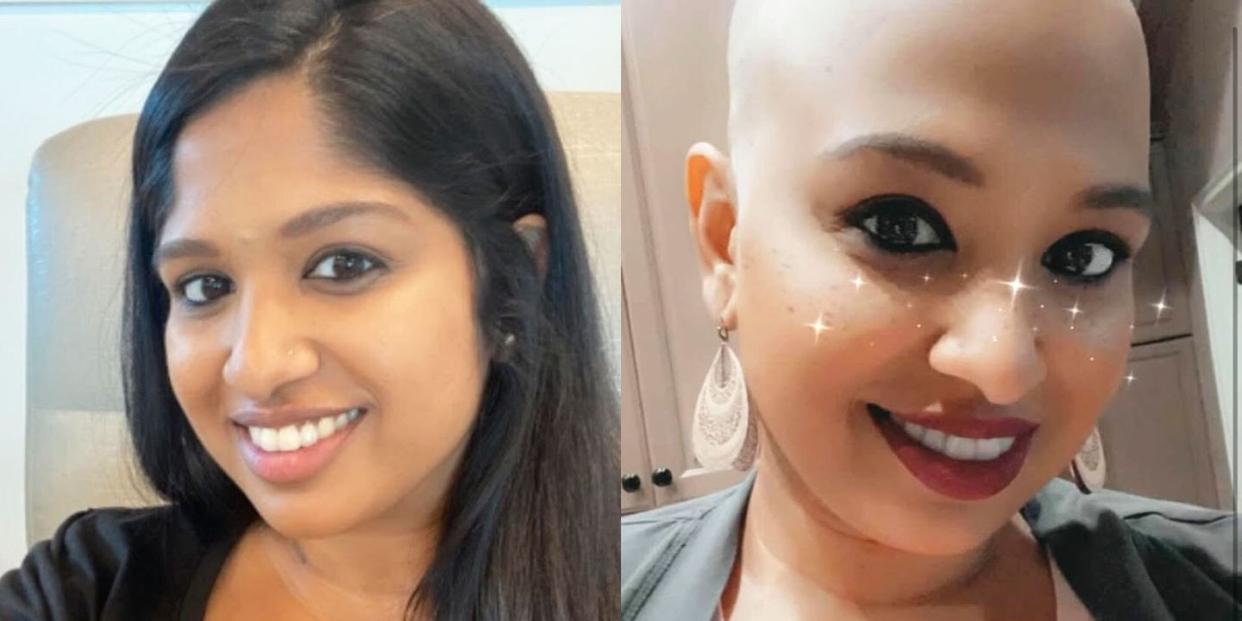
In October 2019, I was a mom of three gradually weaning my 1-year-old daughter off of breastfeeding when I noticed my right breast wasn’t drying up. I thought this was probably because my daughter had always favored that breast, but the way it looked and felt rapidly changed. It became red, hot to the touch, and covered in dimples that looked like an orange peel.
After a Google search and chat with my friend, a nurse, I figured I probably just had a bad case of mastitis. I tried taking Tylenol, compressing my breast, and even the weird home remedy of wrapping it up in cabbage leaves. Nothing worked.
A few months later, my right breast remained larger than usual and had become so tender that it was painful to wear a bra.
It was now December, and although I knew I needed to see a doctor, my ob-gyn had recently retired, and my husband was busier than ever in the midst of peak season as a UPS worker. On top of this, all three of my kids came down with a respiratory infection. They were sick for a good three and a half weeks. To take care of them, I put my needs last. And then, the pandemic hit—which made it even harder to see a doctor.
In early January 2020, a lymph node on my neck flared up and became really tender. It was on the same side as my inflamed breast. This really concerned me, so I scheduled an appointment to see a primary care physician as soon as I could. When I finally got in, the doctor suspected I may have a bad case of mastitis and prescribed a round of antibiotics. But she also immediately set me up to get a diagnostic mammogram and ultrasound in order to rule out breast cancer.
Initially, I couldn’t believe that cancer was a possibility. Growing up, I’d learned about self-checks at school and knew I had to start getting mammograms in my 40s. But I’d always been told that breastfeeding wasn’t just good for my baby—it also came with benefits for moms, including a reduced chance of breast cancer.
Because I was only 30 years old and had no family history, my insurance made it difficult for me to proceed with the tests. I wasn’t able to get their approval until this past February. After viewing my results, a radiologist still thought I *might* just have a really stubborn case of mastitis, but they couldn’t be sure—so I was given another round of antibiotics and advised to come back for a biopsy.
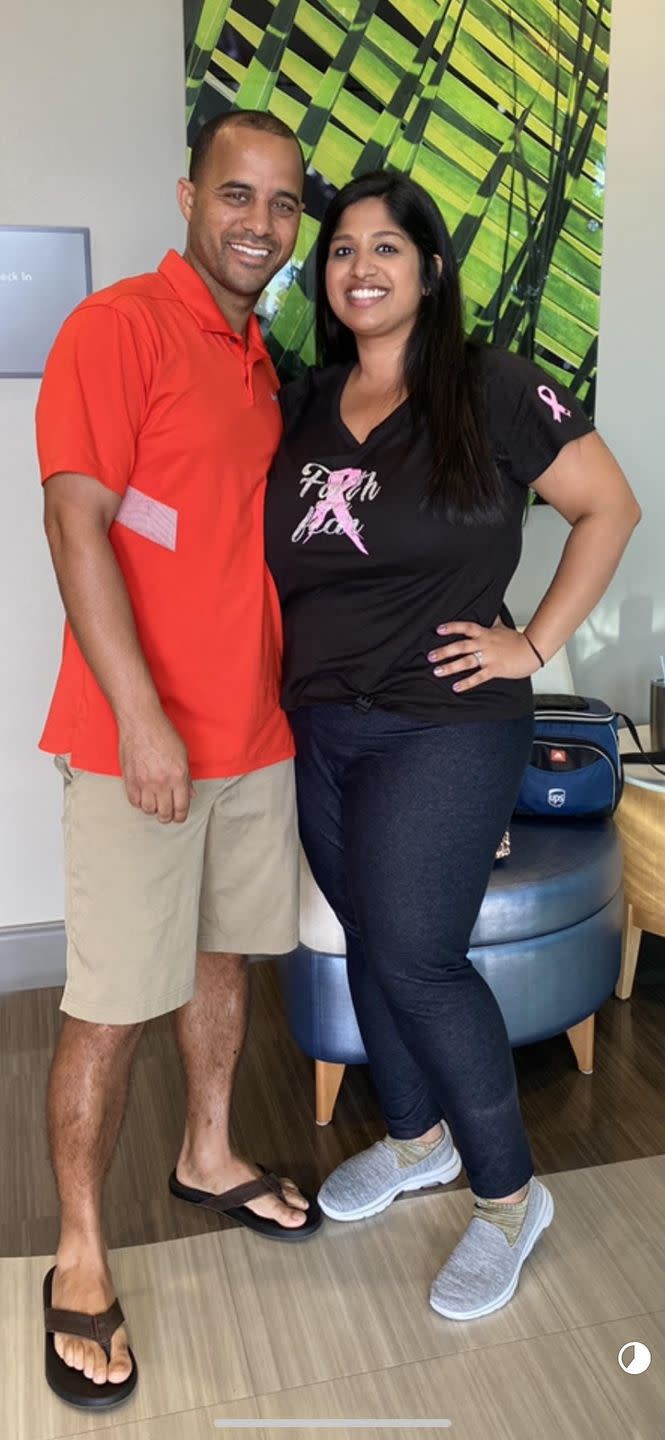
The next day, I got a call from the cancer center. They wanted me to come in right away.
Initially, a biopsy of my skin came back negative, and I was put on two rounds of the strongest antibiotics they had. But a series of internal biopsies confirmed the opposite. On March 4, 2020, I learned I did, in fact, have inflammatory breast cancer (IBC).
When the doctor told me I had stage III inflammatory breast cancer, I was baffled. Like many people, I’d never heard of inflammatory breast cancer, likely because it’s so rare—it only accounts for about 1 to 5 percent of all breast cancers. As I learned, IBC is an aggressive cancer and all cases are first diagnosed as at least stage III since the cancer cells have already grown into your skin.
While I’d always thought of lumps as potential red flags for breast cancer, the initial signs of IBC are completely different, and similar to those of mastitis. And since breast infections are much more common, doctors often go ahead and give you antibiotics when you show up with symptoms like mine.
Signs of IBC include a swollen breast that’s itchy, tender, or painful; red or purplish skin that may dimple or thicken; a retracted or inverted nipple (though mine only got bigger); and, if the cancer has spread, swollen lymph nodes under your arm or near your collarbone.
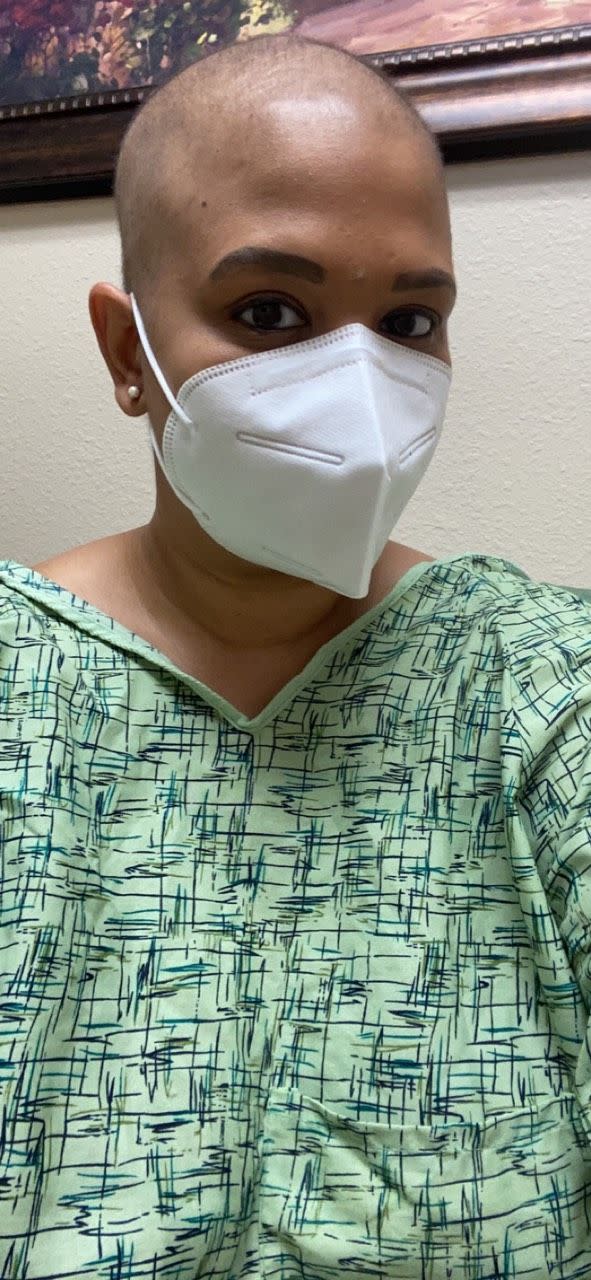
Because IBC often affects women under 40, doesn’t always cause a lump, and may not show up on a mammogram, it tends to be harder to diagnose than other breast cancers. It’s also important to note that it affects Black women more than white women.
When I started researching my diagnosis, I was devastated to find out that the prognosis for IBC was worse than other breast cancers. I was afraid I was going to die and leave my children behind. But my doctor assured me that treatment options were always improving, and we got started right away.
In March 2020, I began the standard treatment for IBC: chemotherapy followed by surgery and radiation.
Because I come from an Indian family, my husband is Cape Verdan, and we’re both first-generation Americans, we really value maintaining open communication with our kids. I told them, “Mommy is very, very sick and will have to get sicker before she can get better.” We also gradually introduced my older son to the term “cancer” and explained to him that there are good and bad cells fighting inside my body.
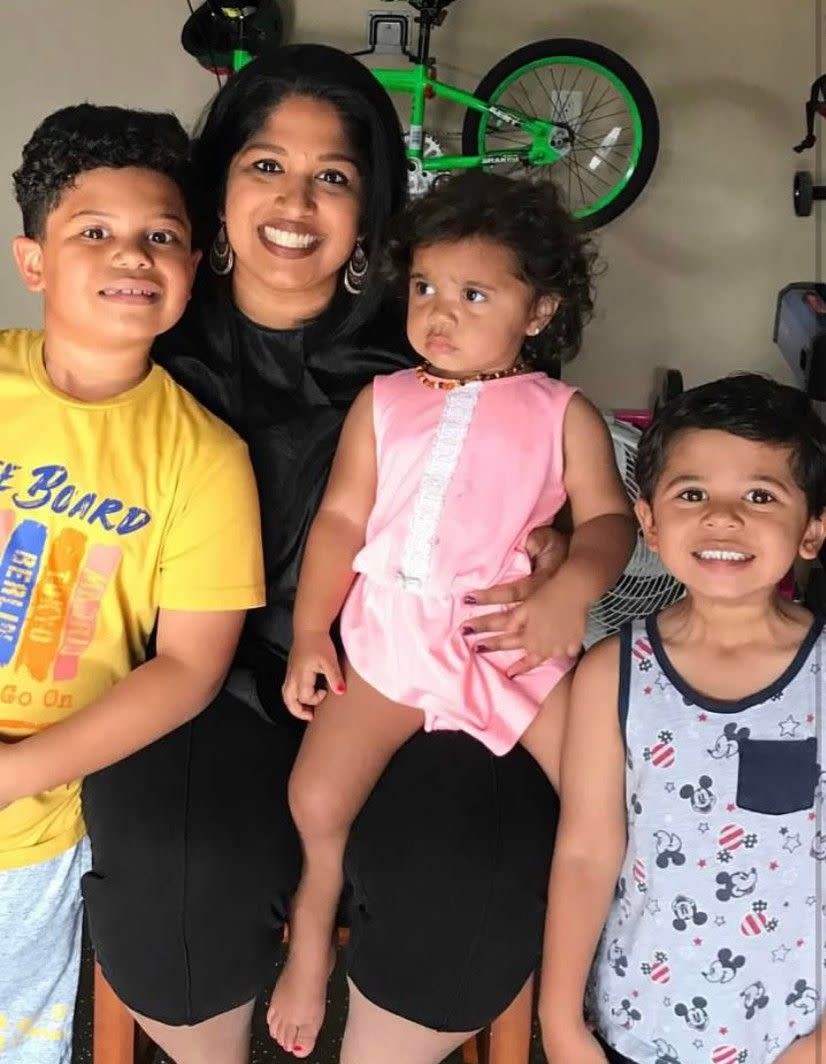
Due to COVID-19, I had to receive treatment alone at the hospital, and while I had a great team, it was hard to spend long days away from my family. Two weeks in, when my hair began to fall out, we experienced this change together. My husband, kids, parents, and sister were present as my brother, an aspiring barber, shaved my head. It was a difficult transition, as my 1-year-old had always stroked my hair to soothe herself when she couldn’t sleep. I tried to give her a doll with a braid to use, but it didn’t work. And although I tried to wear a wig or scarf at first, in the Florida heat, it was unbearable.
Each round of chemotherapy was challenging in its own way, and it was difficult to have little children who couldn’t understand exactly what I was going through. But one of the hardest moments of my life was my double mastectomy in August 2020.
I’d always thought of my 30s as my time. I still wanted to feel young and sexy, and as a large-chested woman, it was difficult to suddenly become completely flat. And because of the aggressive nature of my cancer, my doctor recommended that I wait a year or so for breast reconstruction in order to make sure it was really all gone.
As challenging as these realities have been, over time, I’ve learned to embrace this whole cancer experience.
At first, going out without a scarf, I felt embarrassed and worried someone I knew was going to see me. But then I asked myself, Why do I need to make myself uncomfortable? I didn’t do anything to cause my hair loss, so I shouldn’t be ashamed of it.
One of my greatest fears was missing out on time with my children while they were at school, but since I’m immunocompromised, we’ve had so much quality time together at home. Before COVID-19, we were so busy with school and life and work that we took so many things for granted. Now, we’ve been able to ride bikes and scooters in the morning, play in the backyard, make forts (and keep them up for days), do arts and crafts together, and have family read-alouds with books from the library. I’m deeply thankful for all of these blessings, as well as the help I’ve received from my caregivers, my husband and parents, prayers from our loved ones, and the support of my medical team—I couldn't have gotten through this without them.
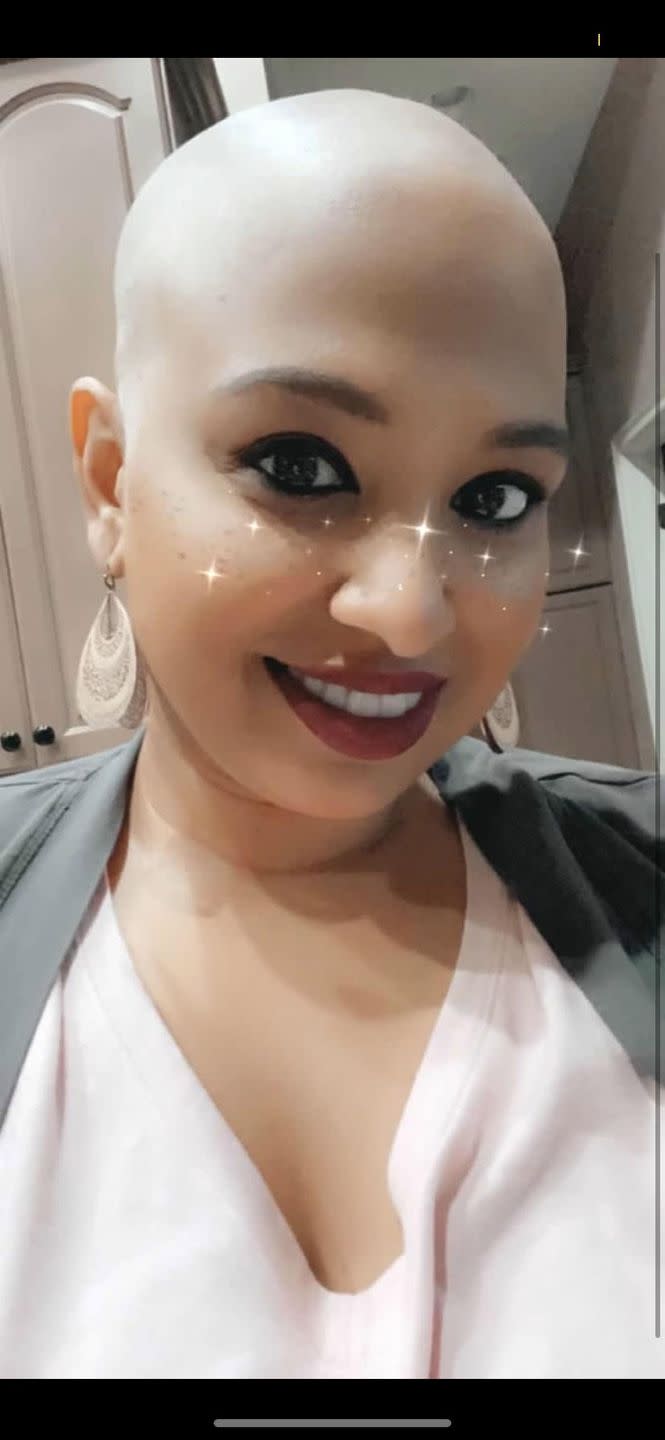
On August 19, 2020, I received my latest pathology report, and I’m so happy to share that there was no evidence of cancer found.
That meant my chemotherapy worked! I’m scheduled to complete my treatment plan by July 2021.
To this day, many of my family members don’t know about my diagnosis and condition. While our Indian culture has become very open, in the past, it wasn’t. We didn’t talk about these things—we just learned through school or our friends. This is part of why I’m sharing my story today: I want to change that.
In light of my experience, I believe it’s so important that we normalize talking about breast health and self-checks—including during and after pregnancy. I talk to my friends about it, and I plan to educate my children so they can, in turn, educate their own someday.
You Might Also Like

